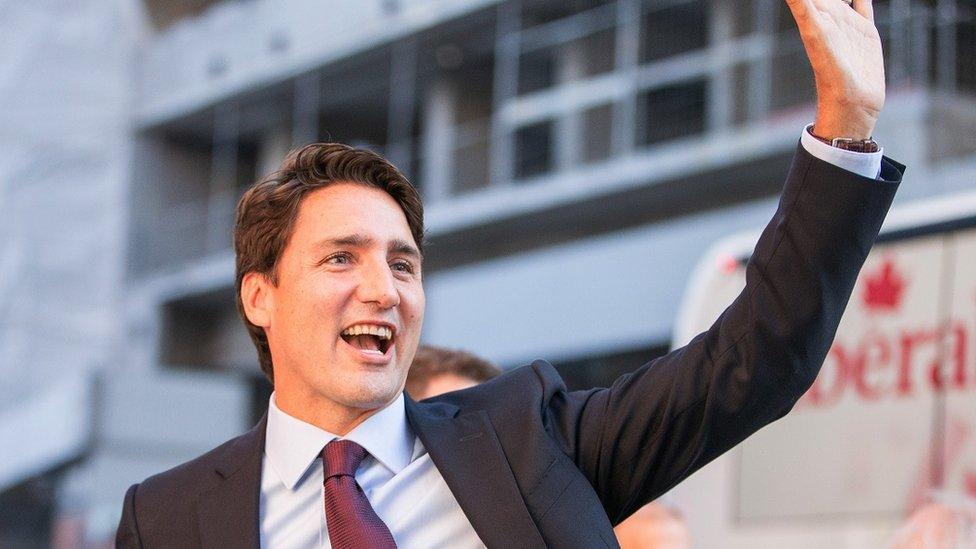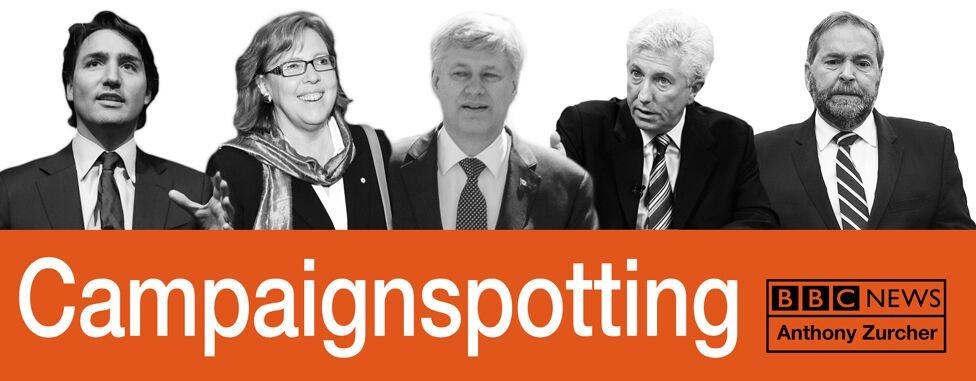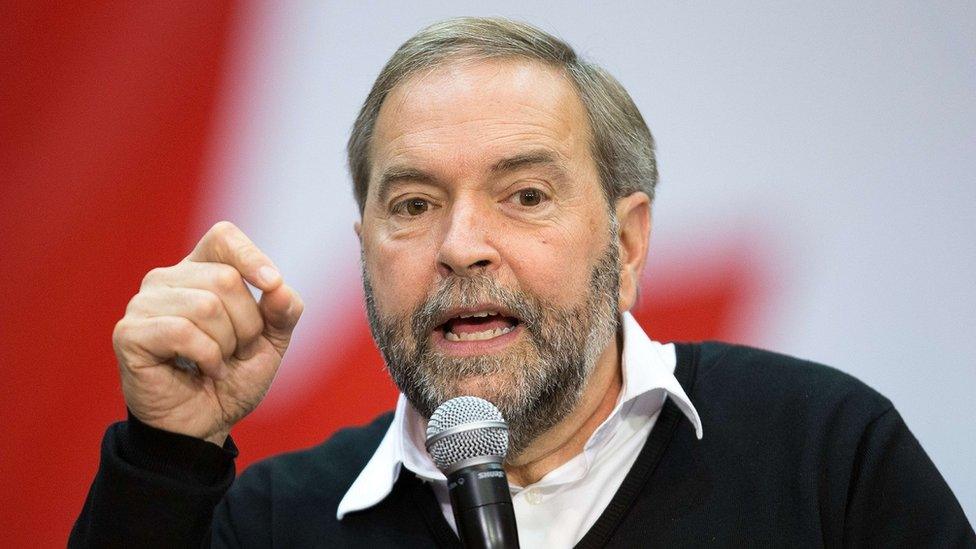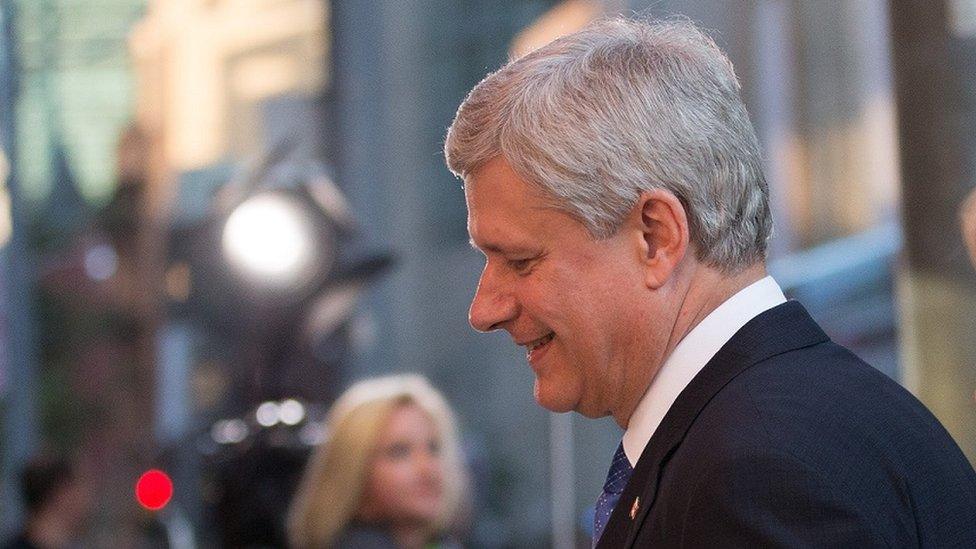A Liberal tipping point in Canada?
- Published

Is the Canadian general election approaching a tipping point?
For much of this 78-day campaign season, the three parties - the incumbent Conservatives and the left-centre Liberals and New Democratic Party - have effectively been tied in the polls, all at around 30%.
If the Nanos Research tracking poll, external is any indication, however, that could be changing. Starting on 26 September, the NDP - the often-overlooked left-leaning party that saw a surge in popularity in the past year culminating in a surprising provincial victory in traditionally conservative Alberta - began a precipitous decline, from 30.3% to its current 23%.
At first the Conservatives were the beneficiaries, but October has been kind to the Liberals, and they now stand atop the polls with 34.3%, ahead of the Conservatives' 32.1%.
Also encouraging for the Liberals is that 49.7% of poll respondents would consider voting for their party. Only 41.6% said they would consider voting for the Conservatives, while 40.3% would entertain supporting the NDP. The ceiling, it seems, is higher for the Liberals.

Other surveys have the Conservatives edging the Liberals out - and still likely to win a plurality of seats in parliament - but there is undeniable evidence that the NDP is slipping.
"I want to see more of a consensus of pollsters but the Nanos numbers sure look like the start of something big," tweets, external Calgary-based political strategist Corey Hogan.
So what's behind this latest development?
A 30-30-30 balance all the way to the end was always bound to be unlikely, given that it requires a clear majority of voters opposed to Prime Minster Stephen Harper to stay evenly split between the NDP and Liberals. As the 19 October election day draws closer, left-leaning Canadians may become more disposed to strategic voting - that is, picking the party they view as more likely to unseat the Conservatives
Of the two left-of-centre candidates, Liberal Justin Trudeau is considered, external to have emerged from the series of five English and French national debates in better shape than NDP's Thomas Mulcair.
Given that the Conservatives have attempted to brand Mr Trudeau as inexperienced and lacking the mettle to be prime minister, he had a manageable bar to clear for success.

Thomas Mulcair has to convince Canadians to view the NDP as a party capable of running the nation
Canadian voters "were conditioned to expect a bumbling idiot", writes, external Adam Radwanski of the Toronto Globe and Mail. "By being pretty decent at what he does, he has fashioned a comeback story."
Meanwhile, the goal for Mr Mulcair was more nebulous - to sell the nationally untested NDP as a legitimate governing party on the left and a realistic alternative to the established Liberal brand. The recent decline may be evidence that his efforts have been unsuccessful.
On Sunday, speaking at a hockey arena before a crowd of around 15,000 in a Toronto suburb, Mr Trudeau sounded like a candidate with the political wind at his back. He cast himself as the candidate for change and lambasted Mr Harper for being out of touch with Canadian voters on issues like the need to address income inequality and increase infrastructure spending.
He also condemned the prime minister for running what he says has been a divisive campaign playing on fears of outsiders and threats to national security. High on that list, according to Liberal critics, is Mr Harper's decision to limit the number of Syrian refugees admitted into the country, to support revoking citizenship of those convicted of terrorist offences and to challenge a recent court order allowing women to wear a face-covering niqab while taking a citizenship oath.
"In 10 years, Stephen Harper has never missed an opportunity to divide Canadians," Mr Trudeau said, external. "East against west. Urban against rural. French against English. So-called 'old stock' Canadians vs newcomers."

Canadian general election 2015
• Canadian election day is 19 October. Its formal campaign season lasts 78 days.
• The Canadian Parliament is comprised of 338 constituencies, called ridings.
• Members of parliament are elected in a "first past the post" system where the candidate with the most votes wins.

"His first instinct is to appeal to the worst instincts," he continued. "He and his party have brought unprecedented nastiness to our country's public life. Their way of doing politics is mean and small and negative. It doesn't have to be that way, my friends."
He only took one swipe at Mr Mulcair, in French - likely targeting voters in Quebec, a former NDP stronghold that could be fertile ground for Liberal candidates.
With slightly under two weeks remaining until Canadian voters head to the polls, there could still be a few twists and turns in the campaign before it's all over, of course.
One possible wildcard is the recently concluded negotiations over the Trans-Pacific Partnership - which includes Canada, the US, Japan and nine other Pacific nations. It may provide a boost for the Conservative Party that inked the deal or Mr Mulcair, who has roundly condemned the agreement.
Mr Trudeau has only said that the agreement deserves "a fulsome and responsible discussion" in Parliament and that his party is "resolutely and consistently pro-trade".

Mr Harper points to the recently concluded Trans-Pacific Partnership as a reason to re-elect Conservatives
"Because the election is only 13 days away, the TPP agreement could hardly have been more splendidly timed for the Conservatives," writes, external Lawrence Martin in the Globe and Mail. "Liberal Leader Justin Trudeau has been gaining momentum, breaking far in front of the NDP and passing the Conservatives in some polls. He is basing much of his campaign on the economy but now finds himself essentially agreeing with Stephen Harper on a major economic initiative."
Part of the NDP's previous rise can be attributed to its firm stand against the government surveillance law C-51, in contrast to the tepid support the Liberals gave the Conservative-backed measure.
Could TPP end up a reprise of this dynamic?
At this point it may be the NDP's last chance and - given the Conservative Party's reliance on divided opposition on the left for its most optimistic electoral scenario - Mr Harper's best hope.
- Published4 August 2015
- Published18 September 2015
- Published23 September 2015